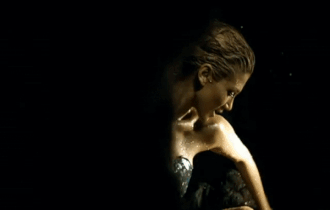Released: 8th December 2007
Writers: Delta Goodrem / Brian McFadden / Stuart Crichton / Tommy Lee Jones
Peak position: N/A
Chart run: N/A
It appeared to be business as usual for Delta Goodrem in 2007 as she resumed her chart-topping success with a new album and single. But that all changed with Believe Again, which was like none of her previous releases and remains one of the best things she’s ever recorded.

Delta Goodrem’s third album – titled Delta – was intended as something of a reset following 2004’s Mistaken Identity. Although it had topped the chart, sales were lower than those of her debut, Innocent Eyes (which, in fairness, spent 29 weeks at #1 in Australia; that level of success would never have been sustainable). Having been written and recorded while Delta Goodrem was treated for Hodgkin’s lymphoma, the album had a darker tone than her debut. But there was more to it than that. Because she’d fallen ill during the Innocent Eyes campaign – causing all promotion to stop – things went into overdrive for Mistaken Identity. It was accompanied by a headline tour, a (brief) return to Neighbours and a lead role in the movie Hating Alison Ashley. Delta Goodrem was burnt out.

As much as Delta was intended to be closer to the lighter, radio-friendly sound of Innocent Eyes, it was not an attempt to recreate that album. She collaborated with a host of new producers and writers – including her then-boyfriend Brian McFadden – to create material that remained distinctively piano-driven but incorporated a wider range of pop, rock, R&B and even reggae influences. That’s not immediately apparent from the lead single, In This Life – which duly earned Delta Goodrem her eighth #1 hit in Australia – but Delta is an album with broader marketability and represented an opportunity for a proper American launch (Lost Without You was a minor Adult Contemporary hit in 2005, but the planned release of Innocent Eyes – with a hybrid tracklist including songs from Mistaken Identity – had been cancelled).

That international ambition didn’t extend to the UK, though, where things were complicated for Delta Goodrem. Her relationship with Brian McFadden began while he was still married to Kerry Katona, which resulted in a lot of negative publicity. The coverage was largely one-sided, and promotion of Mistaken Identity was subsequently curtailed after two singles (despite Out Of The Blue and Almost Here both reaching the top 10). Although never explicitly stated, the decision seemed dictated primarily by an awareness that the intense scrutiny of Delta Goodrem’s personal life would inevitably overshadow anything else. Other factors may have contributed, but the UK was subsequently kept at a distance for about a decade.

Certainly, there’s no other logical reason not to have released Believe Again here because it’s a massive pop track in every respect. The album version – which runs for five minutes and 45 seconds – opens Delta and evokes the sense of an epic, orchestral rebirth of a pop star. Indeed, there’s a reasonable argument that Believe Again deserved to be the lead single because it’s such a statement. Crucially, the radio edit manages to remove over a minute-and-a-half of the track without lessening its impact in any significant way.

Playing the piano became a defining feature of Delta Goodrem’s music after an initial attempt at launching her with the Britney Spears-esque I Don’t Care backfired in 2001. However, it’s not as if she hadn’t experimented in the meantime, particularly on Mistaken Identity. Yet, even then, the songs all fit sonically within her repertoire. Believe Again, on the other hand, steps decisively outside of it. The track opens with an imposingly grand string arrangement that provides an ominous backdrop to the first verse: “Have you ever stared into the rain, thought the clouds would never disappear, have you ever screamed out into the dark, thinking no one else could hear”. Delta Goodrem’s lyrics remain candidly truthful; however, their intensity is elevated significantly by the drama that drapes around Believe Again.

The tone shifts as the production swells through the first pre-chorus (“I was leaving footprints tainted by my past, on this winding road to you, oh”). If there’s one moment which metaphorically pinpoints the transition in Delta Goodrem’s career, where the past – both good and bad – slips away, this is it. The tempo picks up with a new-age beat ushering in the stirring chorus: “I’d lost my faith in love, tonight I believe again, my heart was a broken place, and now, I feel whole again, and you bring me honesty, and that’s worth believing in, and I believe, I believe again”, asserting this as a new era. Believe Again may pull in different emotional directions (“Have you ever spun out of control, like you never saw the road ahead, have you ever just kept looking back, ever closer to the edge”), yet it’s ultimately conveyed with an overriding calmness and serenity.

The middle eight breakdown features some stunning vocal runs from Delta Goodrem using her higher register before a gradual crescendo: “I believe the impossible is possible to overcome, I believe in miracles, born from love in everyone”, into the final chorus. Though effective as a build-up, this section does suffer slightly from being chopped down for the radio edit. It remains perfectly functional, but there’s a theatrical indulgence in the full-length version that makes Believe Again even more of a spectacle. Either way, the result is a change in the status quo and a new creative frontier for Delta Goodrem. The phenomenal highs and devastating lows experienced during Innocent Eyes determined – to some extent – the commercial and narrative trajectory of Mistaken Identity. But what now? That was the unknown Believe Again started to contemplate.

If there hadn’t already been enough should-have-been-lead-single energy rippling through the track, then it was heightened further by the accompanying music video, which was one of the most expensive to have been made in Australia for several years at the time. It opens on a vast, mountainous terrain with Delta Goodrem in a bubbling, steaming rock pool, which she emerges from as stone obelisks float mysteriously around her. In the following sequence, she’s underground, with gold-tinted skin that is covered in glitter (just in case it seems the video is extraneous to the song, a small flame appears in her hand as she sings: “I was praying for the light…”) before a zoom transition shifts back outside. Delta Goodrem now sits atop a rock which is floating through the mountains. She’s then seen floating while black fabric – outstretched like wings – billows around her. Finally, pieces of stone assemble to form circles, which rotate around her while she’s spinning in the air.

The visuals – particularly towards the end – have an impressive cinematic scale. Only the immediate foreground was shot in a studio; everything else was created using green screen technology, and it’s impressively well-realised. Sprawling, dusky blue-grey landscapes bring a degree of atmospheric moodiness, but this isn’t a dark video by any means. There’s an ambiguity as to what is actually happening and accompanying the wrong song, the whole thing could easily come off as a touch pretentious. But Believe Again is precisely the right choice for this kind of treatment. The elemental-mystical influences complement the track, selling it as a bold, ambitious rejuvenation and evolution of Delta Goodrem. Judging by the video treatments for the next two singles from the album – You Will Only Break My Heart, and I Can’t Break It To My Heart – it’s entirely believable that a considerable amount of the entire budget for the Delta campaign probably ended up being spent here.

Although Delta Goodrem was no longer topping the chart with the same consistency as during the Innocent Eyes campaign (all five singles from the album reached #1), her strike rate remained impressive. So, it’s a bit jarring that Believe Again found itself among a comparatively small number of her singles that didn’t reach #1 in Australia. Instead, the track peaked at #2 behind Timbaland and OneRepublic’s Apologize. Though by no means a disaster, it’s just that a shift in sound and super-expensive video feel intended to position Believe Again as the major hit from Delta. Even so, it helped keep the album in the top 10 for over three months and remained Delta Goodrem’s biggest single until 2012, when Sitting On Top Of The World reached #2.

Though Believe Again had limited exposure outside of Australia, it’s nonetheless become a well-regarded part of Delta Goodrem’s back catalogue, even among those who wouldn’t necessarily consider themselves fans of her music in general. And rightly so. Believe Again largely came out of nowhere and pushed the boundaries of the type of artist Delta Goodrem could be. Her talent had never been questioned; she is excellent at what she does. But sometimes, she’s equally good – if not even better – at doing something entirely different.



